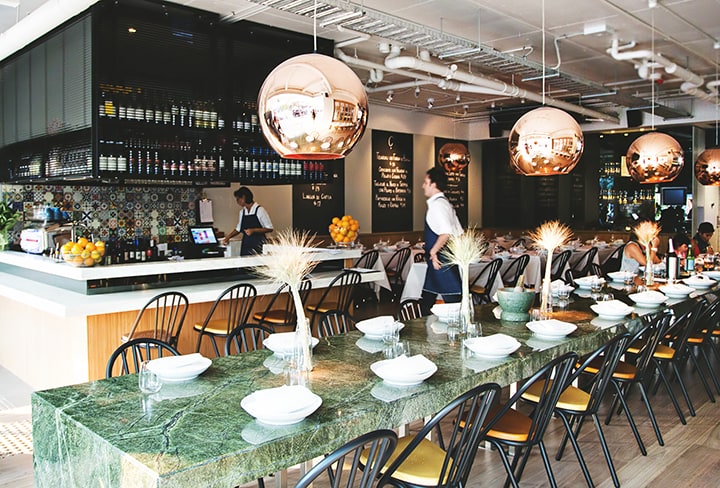
Eugenio Maiale’s table – much like Rome’s ancient ruins or Pisa’s lopsided tower – is definitely worth a look. Situated slap in the centre of Maiale’s A Tavola restaurant (one of the most celebrated Italian restaurants in Sydney); the table is a 10-metre long, moss-green, serpentine marble extravaganza. A mineral homage to all that’s wonderful about Italian cuisine – namely family, conviviality and the promotion of communal eating through generous portion sizes.
The table is where A Tavola restaurant derives its name (literally, to the table). It’s also where founder, director and executive chef Maiale hand-crafts his pasta each morning, and where his patrons sit to enjoy his Abruzzese-style cuisine later in the day. The table, and the idea of dining together, has become a signature for Maiale. So much so that when he opened a second A Tavola restaurant last year in iconic Bondi (the original opened in Darlinghurst, Sydney), a near-identical table had to be sourced. Differing only in colour, the serpentine tables in both the Darlinghurst and Bondi restaurants are made up of a composition of petrified tree roots. Quite fitting when you consider the influence of Maiale’s own roots.
“My family come from Palmoli which is a little town in the region of Abruzzo in central Italy,” he says. “Most of the people that live there are sheep herders… and the story goes that when the herders came home after working hard all day in this mountainous region, one of the main food sources would be pasta because it’s got a lot of carbohydrates for energy.’
 While Maiale himself grew up in suburban Adelaide, his childhood diet was the same: ‘There would always be a bowl of pasta on the table when we sat down. It was the main part of our diet.’ So how did the descendent of sheep-herders become one of the most highly-regarded chefs of Italian cuisine in Australia? That’s easy: with the help of a good woman. A dozen of them, in fact.
While Maiale himself grew up in suburban Adelaide, his childhood diet was the same: ‘There would always be a bowl of pasta on the table when we sat down. It was the main part of our diet.’ So how did the descendent of sheep-herders become one of the most highly-regarded chefs of Italian cuisine in Australia? That’s easy: with the help of a good woman. A dozen of them, in fact.
“My professional journey started in Adelaide,” explains Maiale. “I started as an apprentice in a little place called Rigoni’s.’ Maiale is being modest. Rigoni’s on Leigh Street is something of an Adelaide institution. It’s a fine Italian eatery, frequented by suits and politicians, and in Maiale’s day it was run by local legend Giocondo Caon.
“There were 12 Italian mamas working in the kitchen who came from all different regions of Italy,” says Maiale. “Caon said to me: ‘If you want to be a chef then step into the kitchen and the ladies there will look after you.” That’s how I started my career. I was indentured and apprenticed to the 12 mamas at Rigoni’s!’
Maiale spent the next eight years at Rigoni’s, then the Hyatt, before opening his own restaurant in Adelaide (Citrus) and eventually migrating north-east to Sydney. There, he worked with celebrated chef Stefani Manfredi (“He’s truly an ambassador for Italian food”) before he “got the restaurant bug again and opened up A Tavola”.
That was in 2007. Since then Maiale has opened up A Tavola Bondi and there’s a third, city-centre edition in the pipeline. He also founded Omerta wine bar, which he opened with his ‘dear friend’ the gelato king, Nick Palumbo (founder of Gelato Messina) and which was awarded a coveted chef’s hat during its first year. On top of this, Maiale is a regular on SBS television, a supporter of the Sydney Seafood School and the Italian wine Festival, and is on the Council of Italian Restaurants in Australia. When, exactly, does he find time to sleep?
“With hospitality – with the A Tavola brand – it’s a very personalised business,” says Maiale. “It’s not something that you can run by remote control. It requires a lot of time and dedication and close contact with staff. The love’s got to be there within the business.”
But Maiale is also the first to attest to the importance of good help. “Working with people is the best way to do it. You need people [in order] to be successful,” he says. “People can grow with people. Suppliers can grow, you can grow. As long as you’re both growing in the right direction; that’s what’s important.”
This is key to Maiale’s approach to working with consultants. “It’s important that when you sit down with designers they totally understand your philosophy and your brand and what you’re trying to portray to the industry and the customer,” he says. “Your ideas need to be conveyed to these professionals and – as long as they know the fundamentals of what you’re trying to do – then you can allow them licence to embellish.”
This approach of letting his consultants’ individual talents come to the fore echoes Maiale’s approach to food – he is quick to recognise the value of individual flavours.
“My food philosophy is in keeping with the origins of Italian cuisine. That is, using the freshest of ingredients and not overworking them; letting them speak for themselves,” he says. “Fine Italian cuisine is quite simple in its approach and I follow that philosophy. I’m not really into deconstructing and reinventing the wheel when it has already been invented.”
Andy McClean
